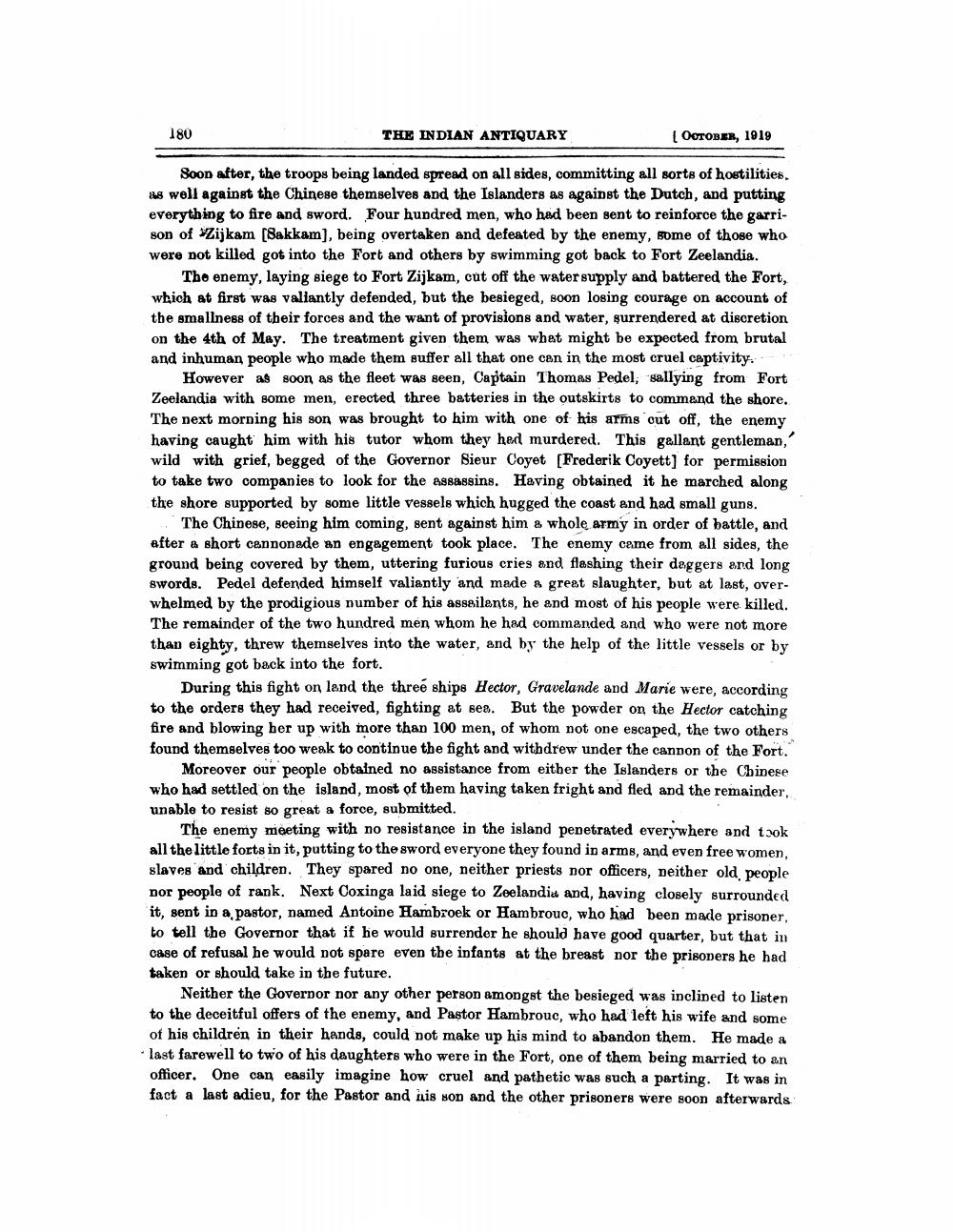________________
180
THE INDIAN ANTIQUARY
[ OCTOBER, 1919
Soon after, the troops being landed spread on all sides, committing all sorts of hostilities. as well against the Chinese themselves and the Islanders as against the Dutch, and putting everything to fire and sword. Four hundred men, who had been sent to reinforce the garrison of Zijkam [Sakkam], being overtaken and defeated by the enemy, some of those who were not killed got into the Fort and others by swimming got back to Fort Zeelandia.
The enemy, laying siege to Fort Zijkam, cut off the water supply and battered the Fort, which at first was valiantly defended, but the besieged, soon losing courage on account of the smallness of their forces and the want of provisions and water, surrendered at discretion on the 4th of May. The treatment given them was what might be expected from brutal and inhuman people who made them suffer all that one can in the most cruel captivity.
However as soon as the fleet was seen, Captain Thomas Pedel, sallying from Fort Zeelandia with some men, erected three batteries in the outskirts to command the shore. The next morning his son was brought to him with one of his arms cut off, the enemy having caught him with his tutor whom they had murdered. This gallant gentleman," wild with grief, begged of the Governor Sieur Coyet [Frederik Coyett] for permission to take two companies to look for the assassins. Having obtained it he marched along the shore supported by some little vessels which hugged the coast and had small guns.
The Chinese, seeing him coming, sent against him a whole army in order of battle, and after a short cannonade an engagement took place. The enemy came from all sides, the ground being covered by them, uttering furious cries and flashing their daggers and long swords. Pedel defended himself valiantly and made a great slaughter, but at last, overwhelmed by the prodigious number of his assailants, he and most of his people were killed. The remainder of the two hundred men whom he had commanded and who were not more than eighty, threw themselves into the water, and by the help of the little vessels or by swimming got back into the fort.
During this fight on land the three ships Hector, Gravelande and Marie were, according to the orders they had received, fighting at sea. But the powder on the Hector catching fire and blowing her up with more than 100 men, of whom not one escaped, the two others found themselves too weak to continue the fight and withdrew under the cannon of the Fort.
Moreover our people obtained no assistance from either the Islanders or the Chinese who had settled on the island, most of them having taken fright and fled and the remainder, unable to resist so great a force, submitted.
The enemy meeting with no resistance in the island penetrated everywhere and took all the little forts in it, putting to the sword everyone they found in arms, and even free women, slaves and children. They spared no one, neither priests nor officers, neither old people nor people of rank. Next Coxinga laid siege to Zeelandia and, having closely surrounded it, sent in a pastor, named Antoine Hambroek or Hambrouc, who had been made prisoner, to tell the Governor that if he would surrender he should have good quarter, but that in case of refusal he would not spare even the infants at the breast nor the prisoners he had taken or should take in the future.
Neither the Governor nor any other person amongst the besieged was inclined to listen to the deceitful offers of the enemy, and Pastor Hambrouc, who had left his wife and some of his children in their hands, could not make up his mind to abandon them. He made a last farewell to two of his daughters who were in the Fort, one of them being married to an officer. One can easily imagine how cruel and pathetic was such a parting. It was in fact a last adieu, for the Pastor and his son and the other prisoners were soon afterwards




